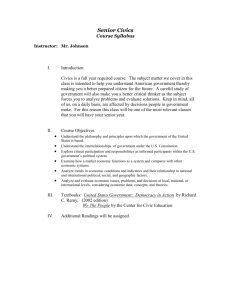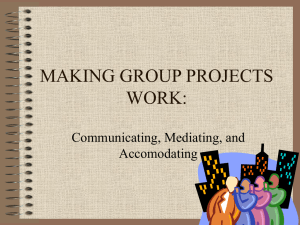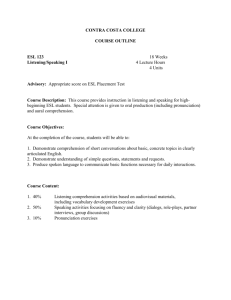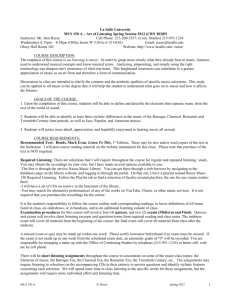educ 316 (3) communication skills in teaching
advertisement
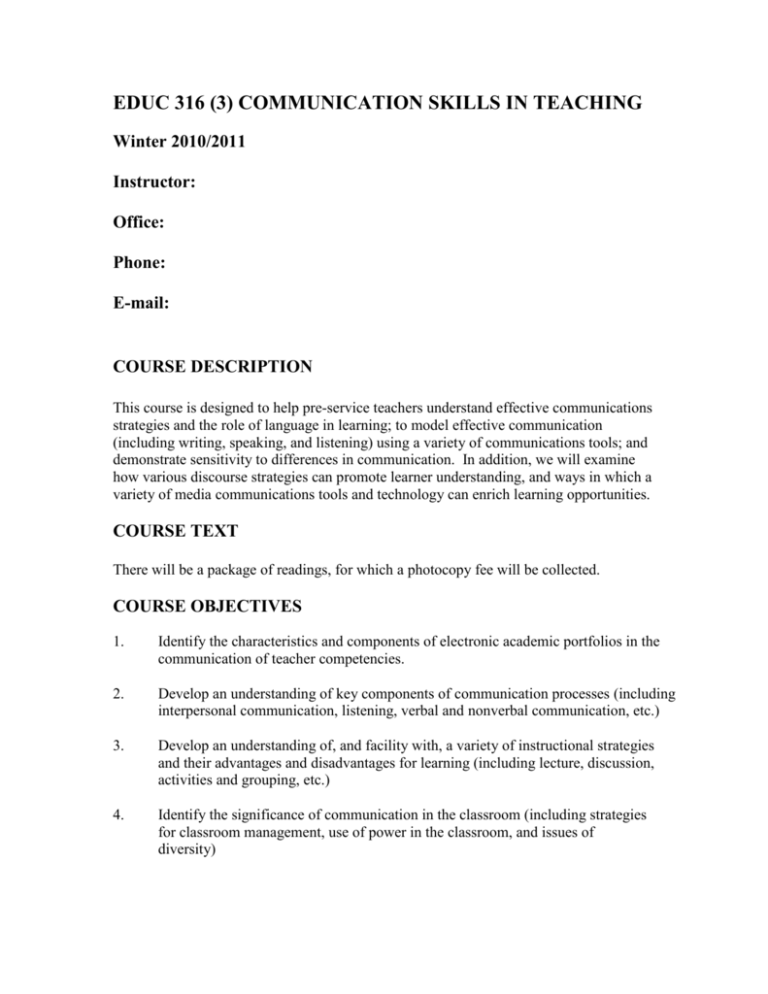
EDUC 316 (3) COMMUNICATION SKILLS IN TEACHING Winter 2010/2011 Instructor: Office: Phone: E-mail: COURSE DESCRIPTION This course is designed to help pre-service teachers understand effective communications strategies and the role of language in learning; to model effective communication (including writing, speaking, and listening) using a variety of communications tools; and demonstrate sensitivity to differences in communication. In addition, we will examine how various discourse strategies can promote learner understanding, and ways in which a variety of media communications tools and technology can enrich learning opportunities. COURSE TEXT There will be a package of readings, for which a photocopy fee will be collected. COURSE OBJECTIVES 1. Identify the characteristics and components of electronic academic portfolios in the communication of teacher competencies. 2. Develop an understanding of key components of communication processes (including interpersonal communication, listening, verbal and nonverbal communication, etc.) 3. Develop an understanding of, and facility with, a variety of instructional strategies and their advantages and disadvantages for learning (including lecture, discussion, activities and grouping, etc.) 4. Identify the significance of communication in the classroom (including strategies for classroom management, use of power in the classroom, and issues of diversity) 5. Develop strategies for communication outside the classroom (including conferencing with, and reporting to parents, initiating and establishing relationships with parents, administrators and colleagues, etc.) 6. Recognize the special communication needs of children of different cultural and linguistic backgrounds, especially students who speak English as a second or other language, and to examine ways of adapting communication to enable the learning of all students. 7. Understand communication issues that affect success of job interviews. COURSE EVALUATION This course has two major areas of evaluation: 1. Assignments 2. Attendance and Participation All expectations regarding attendance, professional conduct, and quality of work in a pass/fail course explained in the Bachelor of Education Student Handbook are followed in COM 316. In addition, the University regulations regarding plagiarism are explained in the UBC calendar and will be strictly followed. It is your responsibility to know these expectations. To pass this course, students are expected to produce work that is of high quality in all assignments and the midterm. Students who do not meet the expected standard in course work may be required to revise, or do supplemental work, or to repeat the course in order to meet expected standards. Students may re-submit an assignment that does not meet criteria once. Pre-submission of assignments is not permitted. Late assignments are not accepted except in circumstances described in the Bachelor of Education Student Handbook. Interim Reports for Continued Problems (please see Student Handbook re. Interim Reports) will be written in circumstances where students have more than one less than satisfactory assignment, or attendance or participation problems. The report will be written by the end of October 2007. COM 316 ASSIGNMENTS 1. 2. 3. 4. Classroom observation Micro-teaching Case study Participation PARTICIPATION Participation is a requirement for this course. This means we expect students to engage actively in the learning experiences in the university classroom, in course readings and assignments. While specific participation activities may vary across sections, general participation expectations for all sections are: attendance (if you are not here, you cannot participate) being on time and staying throughout active engagement with learning experiences participation in discussions attentive listening participation in hands on/experiential activities self and group evaluations peer feedback preparedness (required reading, required materials) TERM 1 Topic Time Focus 1 week (4 hours) E-folio UBC ASR Development of an academic e-portfolio Characteristics of evidentiary documents/artifacts 1 week (4 hours) Listening 2 weeks (8 hours) Teacher presence and teacher language The professional significance of productive listening Non-verbal communication Personal style in communication Organization for communication and management Identifying strategies that promote student involvement in learning 2 weeks (8 hours) Time Communication needs of diverse learners and their contexts TERM 2 Topic 1 week (5 hours) Communication needs of Aboriginal children 1 weeks (5 hours) Communicating with parents 1 weeks (5 hours) Communicating with colleagues, administrators and presenting to others 1 weeks (5 hours) Communicating for employment Language development ESL learners Meta-language for learning Focus Building cultural awareness Recognizing students’ background knowledge and experiences Conferencing Report cards Formal/Informal meetings ESL and minority group parents Relationships with colleagues Presenting to colleagues Interviewing for a teaching position Transforming the eportfolio




